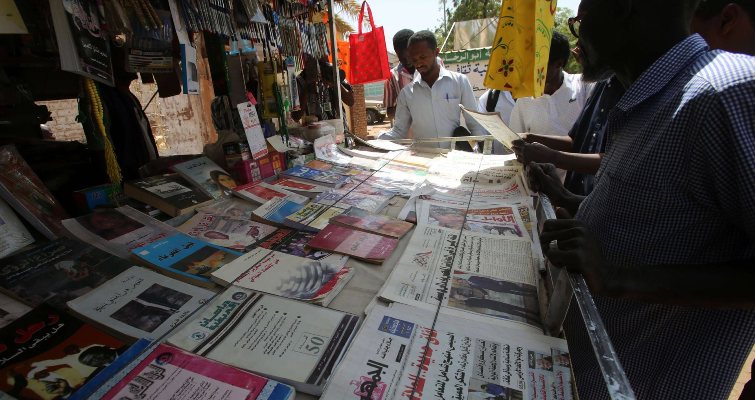Sudanese security exerts mounting control over newspaper industry

January 1, 2017 (KHARTOUM) – Despite the lift of pre-publication censorship, the Sudanese press continues to suffer from confiscations by the National Intelligence and Security Services (NISS) which has increasingly tightened its grip on printing, distribution and paid advertising in newspapers.
The NISS has shown unflinching determination to carry out mass confiscations against newspapers deemed to cross what it describes as “redlines”. In February 2015, it seized print runs of 14 newspapers from the printing press on one day.
During the last couple of months, the NISS confiscated copies of the various newspapers 32 times.
Chief-Editor of Al-Jareeda daily Ashraf Abdel-Aziz told Sudan Tribune that the NISS seized his newspaper 27 times during the last year, pointing that the National Council for Press and Publications (NCPP) also suspended the news daily four times.
He said the repeated confiscations have inflicted at the very least 600,000 pounds (SDG) (about $38,000) financial loss on the newspaper, pointing that Al-Jareeda doesn’t receive any paid advertising from the government.
Abdelaziz pointed that the Minister of Information Ahmed Bilal Osman has previously said the “government would give its paid advertising to whoever it wants”, saying Al-Jareeda was confiscated 11 times in December 2016.
In previous statements, Abdel-Aziz said they recently received an “alarming explicit order from the NISS demanding us to stop two of our opinion writer, Osman Shabona and Zuhair Siraj”, stressing they “wouldn’t change the editorial line of the newspaper”.
However, publisher and Chief-Editor of Al-Tayyar daily Osman Merghani believes his newspaper was the most affected by the repeated confiscations and suspensions, saying it was suspended the during the entire first half of last year.
He told Sudan Tribune that entire print runs of Al-Tayyar has been confiscated 10 times from the printing house by the NISS without reasons last year, saying the news daily’s loss is estimated at one million pounds (SDG) (about $63,000).
Also, on December 27th, 2016, the NCPP suspended Al-Tayyar for three days following a complaint from the judiciary against a column published by the newspaper discussing some court proceedings.
For his part, Chief-Editor of Al-Saiha daily al-Nour Ahmed al-Nour said his newspaper was seized 6 times during 2016, pointing their financial loss is estimated at 400,000 pounds (about $25,000).
The frequency of confiscations varies with the political climate in the country. For example, newspapers were seized 9 times during the first quarter of 2016 while there were 32 confiscations between late November and December after the NISS imposed restrictions on covering news of the recent civil disobediences actions.
NISS’s attempts at taming newspapers weren’t only confined to repeated confiscations but also include controlling the government paid advertising and printing market.
It is noteworthy that the NISS owns the International Printing Press (IPP) which prints the majority of the news dailies in the countries.
Director of Al-Ashiqa Printing Press Mohamed Wida’a told Sudan Tribune that the IPP has monopoly over printing of 80% of the newspapers in Sudan.
He pointed that despite a presidential decree to privatize 42 companies belonging to the regular forces, the NISS has expanded the IPP and established a second printing press in a clear violation of the decree.
It should be recalled that the NISS also owns two newspapers’ distribution and advertisement companies.
Also, in 2013 the NISS acquired the independent daily Al-Sahafa newspaper and bought the majority of shares of Al-Khartoum newspaper before it was sold to its original publisher.
Moreover, the NISS encompassed the prosecution of journalists for their profession and the preclusion of journalists, writers, opinion makers from writing for security reasons.
According to the Sudanese Journalists Network (SJN), the Press and Publications Court has 11 cases against journalists and chief-editors in 2016.
(ST)
